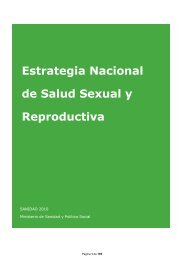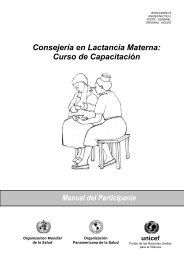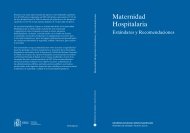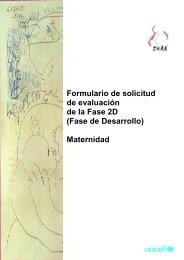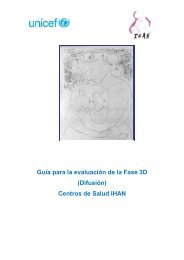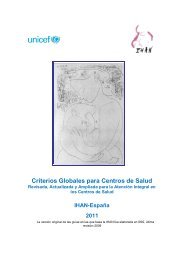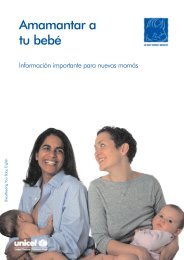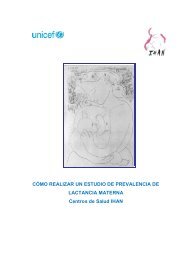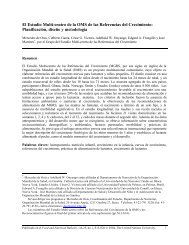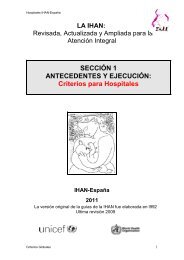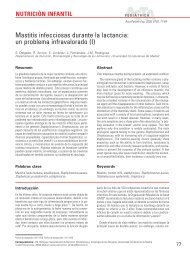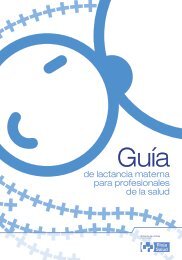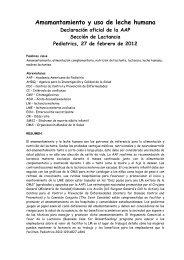La alimentación del lactante y del niño pequeño - libdoc.who.int ...
La alimentación del lactante y del niño pequeño - libdoc.who.int ...
La alimentación del lactante y del niño pequeño - libdoc.who.int ...
You also want an ePaper? Increase the reach of your titles
YUMPU automatically turns print PDFs into web optimized ePapers that Google loves.
6. ALIMENTACIÓN APROPIADA EN CIRCUNSTANCIAS EXCEPCIONALMENTE DIFÍCILES<br />
69<br />
Referencias<br />
1. WHO. Optimal feeding of low-birth-weight infants:<br />
technical review. Geneva, World Health Organization,<br />
2006.<br />
2. WHO. Managing newborn problems: a guide for<br />
doctors, nurses and midwives. Geneva, World<br />
Health Organization, 2003.<br />
3. WHO. Hypoglycaemia of the newborn. Geneva,<br />
World Health Organization, 1997 (WHO/CHD/<br />
97.1).<br />
4. United Kingdom Association for Milk Banking.<br />
Gui<strong>del</strong>ines for the establishment and operation of<br />
milk banks in the UK. 3rd edition. London, United<br />
Kingdom Association for Milk Banking, 2003<br />
(http://www.ukamb.org).<br />
5. WHO. Kangaroo mother care: a practical guide.<br />
Geneva, World Health Organization, 2003<br />
6. Prudhon C et al., eds. WHO, UNICEF and SCN<br />
informal consultation on community-based management<br />
of severe malnutrition. Food and Nutrition<br />
Bulletin, 2006, 27(3):S99–S108.<br />
7. WHO. Management of severe malnutrition: a manual<br />
for physicians and other senior health workers.<br />
Geneva, World Health Organization, 1999.<br />
8. WHO. Management of the child with a serious infection<br />
or severe malnutrition: gui<strong>del</strong>ines for care at the<br />
first-referral level in developing countries. Geneva,<br />
World Health Organization, 2000.<br />
9. WHO. Relactation: review of experience and recommendations<br />
for practice. Geneva, World Health<br />
Organization, 1998 (WHO/CHS/CAH 98.14).<br />
10. Emergency Nutrition Network. Infant feeding in<br />
emergencies. Module 1: For emergency relief staff,<br />
orientation and reference; Module 2: For health and<br />
nutrition workers in emergency situations. Geneva,<br />
ENN, 2007 (http://www.ennonline.net/ife/<br />
results.aspx?tag=74, accessed 3 November 2008).<br />
11. Jacobsen M et al. Breastfeeding status as a predictor<br />
of mortality among refugee children in an<br />
emergency situation in Guinea-Bissau. Tropical<br />
Medicine and International Health, 2003, 8(11):<br />
992–996.<br />
12. Save the Children Alliance. Meeting the nutritional<br />
needs of infants in emergencies: recent experiences<br />
and dilemmas. Report of an International Workshop.<br />
London, Institute of Child Health, 1999.<br />
13. United Nations High Commissioner for Refugees.<br />
Policy on the acceptance, distribution and use<br />
of milk products in feeding programmes in refugee<br />
settings. Geneva, United Nations High Commissioner<br />
for Refugees, 1989.<br />
14. Seal A et al. Review of policies and gui<strong>del</strong>ines on<br />
infant feeding in emergencies: common grounds<br />
and gaps. Disasters, 2001, 25(2):136–148.<br />
15. WHO/UNICEF/UNAIDS/UNFPA. HIV transmission<br />
through breastfeeding: a review of available<br />
evidence, 2007 update. Geneva, World Health<br />
Organization, 2008.<br />
16. Coovadia HM et al. Mother-to-child transmission<br />
of HIV infection during exclusive breastfeeding in<br />
the first 6 months of life: an <strong>int</strong>ervention cohort<br />
study. <strong>La</strong>ncet, 2007, 369(9567):1107–1116.<br />
17. WHO/UNICEF/UNFPA/UNAIDS. HIV and<br />
infant feeding technical consultation held on behalf<br />
of the Inter-agency Task Team (IATT) on prevention<br />
of HIV infections in pregnant women, mothers<br />
and their infants: consensus statement. Geneva,<br />
World Health Organization, 2006.<br />
18. WHO/UNICEF/UNFPA/UNAIDS. HIV and<br />
infant feeding update. Geneva, World Health<br />
Organiza tion, 2007.<br />
19. WHO. HIV and infant feeding: framework for priority<br />
action. Geneva, World Health Organization,<br />
2003.<br />
20. WHO/UNICEF/USAID. HIV and infant feeding<br />
counselling tools: reference guide. Geneva, World<br />
Health Organization, 2006.<br />
21. WHO. Infant and young child feeding counselling:<br />
an <strong>int</strong>egrated course. Geneva, World Health<br />
Organization, 2007.<br />
22. WHO/FAO. Gui<strong>del</strong>ines for the safe preparation,<br />
storage and handling of powdered infant formula.<br />
Geneva, World Health Organization, 2007 (http://<br />
www.<strong>who</strong>.<strong>int</strong>/foodsafety/publications/micro/<br />
pif2007/en/, accessed 5 November 2008).<br />
23. WHO/UNICEF/UNFPA/UNAIDS. HIV and infant<br />
feeding: gui<strong>del</strong>ines for decision-makers (revised).<br />
Geneva, World Health Organization, 2003.<br />
24. Sidley P. Wetnursing increases the risk of HIV<br />
infection among babies. British Medical Journal,<br />
2005, 330:862.



